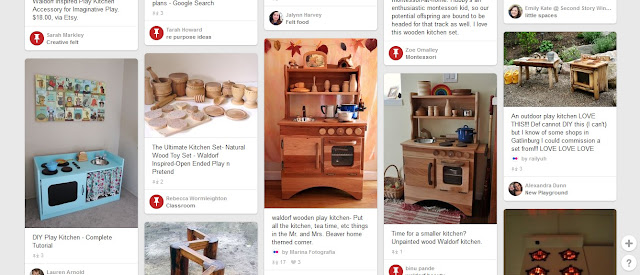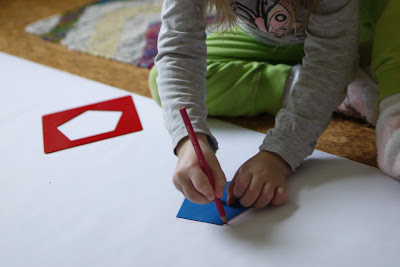Waldorf play kitchen or Montessori practical life corner?
I have joined both Waldorf and Montessori themed groups on Facebook (Waldorf Life and Montessori 101), where people ask and share on the most different subjects related to each of the theories.
One very popular subject in the Waldorf group is the very cute play kitchens that people make for their children. They are adorable - little ovens and shelves, tiny sinks and dining tables, not missing the silverware or even cooking gloves. Some are simple and selfmade, some look like they cost a lot. But there is a lot of detail in them - detail made by the parents. (And parents write, how they re-organise these play areas at night, or what their plans are on making them even cuter..)
I immediately make a plan to get one for my children. (They are so cuuuute!) But then it makes me think.. How exactly is this Waldorf? Yes, Waldorf is a lot about imaginary play with dolls and role-play, something that all the children (should) do. But aren't the toys suppoused to be open-ended? Aren't they suppoused to be used in many ways, transformed into all these amazing things, just by your imagination? (Like you can do with Waldorf play silks or wooden blocks..) Then why are these kitchens so adult-made and ready, to the tiniest detail?
It makes me remember my own childhood again, which, as I have said before - was unintentionally very Waldorf. We made our play houses ourselves, in a variaty of places, inside and outside. They transformed and changed, but were made of the things we could find, we had almost nothing ready-made, apart from a questionable table and dishes that we stole from the kitchen. This was imagination at it's best, this was fun..
And my husband just said the same thing, when I showed him a Waldorf play house, that I want to make. He said: "Hmm.. We used to make that ourselves, from chairs and bed sheets."
So are these cute ready-made play kitchens really investing into development of imagination?
However, recently I saw a Montessori kitchen for children, which at first glance seemed very similar. But looking at it closer, it is not at all a "play" kitchen - it is a totally real kitchen-like area, custom made for children, in their size and to their ability, meant to be used for actual practical work, so-called "practial life" - cutting or peeling vegetables, pouring juice, doing even some simple cooking or dishwashing. All the tools are real, meant for real use, just in a child size.
Montessori believes, this is the most important task for children in the first 3 years of life - to learn the practical skills needed in life. For the sake of being able and independant. (Not so that the adults would have it easier, but because child wants to be independant and do it himself, gaining confidence and self-respect on the way.) And Montessori believes children in these early years enjoy these activities even more than pretent play - that there is nothing more fun and worthwhile for a little child than to manage cutting a banana for his own snack or participating in a family dinner preparation by peeling the potatoes (but very importantly - with suitable tools and work environment).
I must say, however cute the Waldorf kitchens are, I agree with Montessori here more.. It looks like there is more point in investing into a child-sized kitchen tools and dishes (which are not cheap), creating an area in our own kitchen, for example, than setting up a totally ready play house.
I'm sure children will do their imaginative play anyway, but on their own, building their homes. (Isn't the process of creating it sometimes more fun than the actual ready result?)
But I would love to hear some comments or opinions on this subject, why someone thinks the Waldorf kitchen is the best, am I right or wrong.
One very popular subject in the Waldorf group is the very cute play kitchens that people make for their children. They are adorable - little ovens and shelves, tiny sinks and dining tables, not missing the silverware or even cooking gloves. Some are simple and selfmade, some look like they cost a lot. But there is a lot of detail in them - detail made by the parents. (And parents write, how they re-organise these play areas at night, or what their plans are on making them even cuter..)
 |
| A shot from Pinterest of Waldorf play kitchens |
It makes me remember my own childhood again, which, as I have said before - was unintentionally very Waldorf. We made our play houses ourselves, in a variaty of places, inside and outside. They transformed and changed, but were made of the things we could find, we had almost nothing ready-made, apart from a questionable table and dishes that we stole from the kitchen. This was imagination at it's best, this was fun..
And my husband just said the same thing, when I showed him a Waldorf play house, that I want to make. He said: "Hmm.. We used to make that ourselves, from chairs and bed sheets."
So are these cute ready-made play kitchens really investing into development of imagination?
However, recently I saw a Montessori kitchen for children, which at first glance seemed very similar. But looking at it closer, it is not at all a "play" kitchen - it is a totally real kitchen-like area, custom made for children, in their size and to their ability, meant to be used for actual practical work, so-called "practial life" - cutting or peeling vegetables, pouring juice, doing even some simple cooking or dishwashing. All the tools are real, meant for real use, just in a child size.
 |
| Montessori practical life kitchens on Pinterest |
I must say, however cute the Waldorf kitchens are, I agree with Montessori here more.. It looks like there is more point in investing into a child-sized kitchen tools and dishes (which are not cheap), creating an area in our own kitchen, for example, than setting up a totally ready play house.
I'm sure children will do their imaginative play anyway, but on their own, building their homes. (Isn't the process of creating it sometimes more fun than the actual ready result?)
But I would love to hear some comments or opinions on this subject, why someone thinks the Waldorf kitchen is the best, am I right or wrong.




You should also consider she might not like the simple kitchen...A friend in CZ made a very simple kitchen out of a nightstand (or some cabinet or whatever) and their daughter never played with it...
ReplyDeleteWell, it would be a bit disappointing. But not a reason to get a fancy kitchen because of that.
Delete